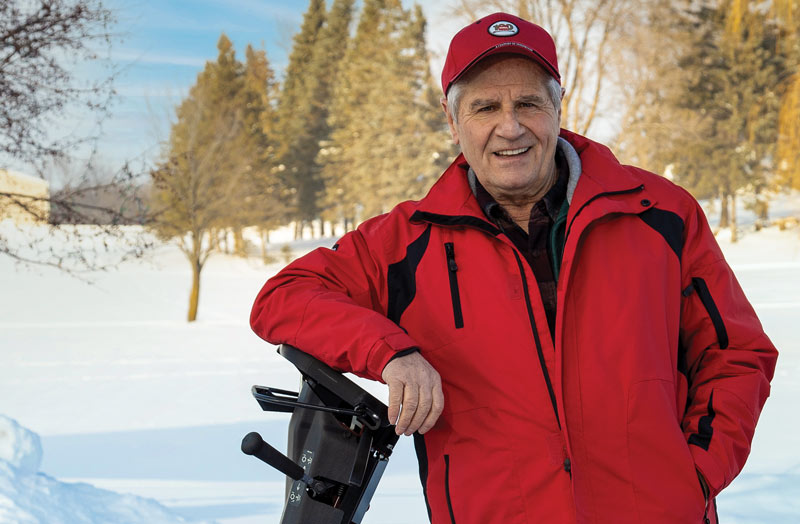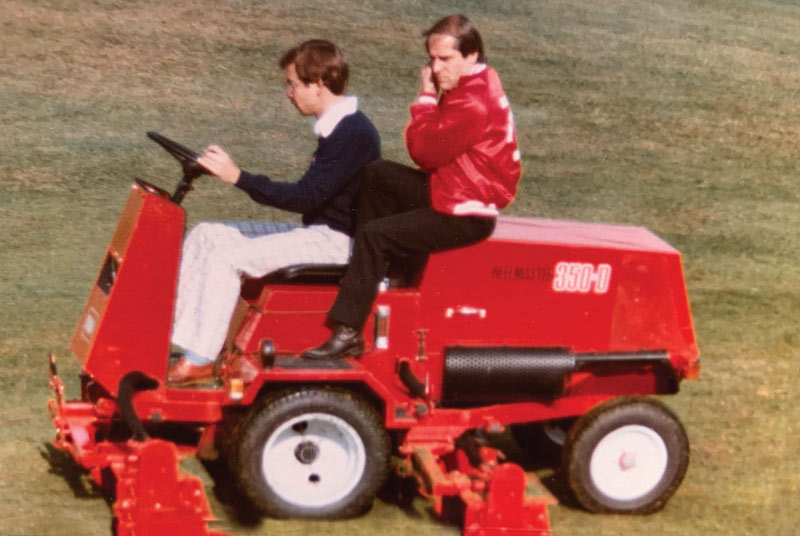
Helmut Ullrich at his home in Minnetrista, Minn. Photo by Lorri Downs
Helmut Ullrich kept an eye out for superintendents. Lee McLemore, CGCS, saw that firsthand.
As senior product marketing manager for The Toro Co., Ullrich was all ears when McLemore made a request more than three decades ago. McLemore, director of golf course operations at the Country Club of Birmingham (Ala.), asked Ullrich whether Toro could design what amounted to a state-of-the-art walk-behind mower.
Turns out, his wish was already in the works.
“Less than a year later, in the Toro booth at the Golf Industry Show ... they had it. As I walked by, he (Ullrich) just kind of winked at me,” says McLemore, a 35-year GCSAA member. “He knew our needs before we did. The first time I met him, I could tell he knew what he was doing and was persistent about the products he was helping develop. I’m not sure if it was that accent of his, but you knew he was somebody you’d want to pick his brain.”
There was no language barrier for Ullrich, a native of Germany, when it came to golf course superintendents. When they spoke, he listened. “I was in the field a lot, and I was so interested in what they do,” Ullrich says.
He backed it up with his groundbreaking work in product development, and he picked up an affectionate nickname for his efforts. “He was kind of known as Mr. Greens Mower,” says Jerry Goman, senior principal design engineer for Toro.
Last October, the Ullrich era ended with his retirement after 46 years at Toro, yet his contributions are historic and ongoing. His compelling act was accelerated in 1986 when he was asked to focus on the growth and profitability of Toro’s reel mower arsenal, highlighted by greens mowers. His aptitude and his background in engineering and business were instrumental in leading the charge for a group of talented engineers with whom he collaborated to make changes that resulted in an improved financial situation and a positive trajectory in the golf space for Toro.
Superintendent Lee Strutt, CGCS, MG, MS, a 20-year GCSAA member who is grow-in superintendent/estate manager at Les Bordes Golf Club in Saint-Laurent-Nouan, France, says, “Helmut has been talented in developing equipment that has allowed turf surfaces to improve significantly while increasing productivity, allowing so much more time to achieve even more on the golf course. As an end user, I am thankful for Helmut’s passion and expertise that has allowed me to push the playing surfaces for my members.”
Born in 1943, Ullrich remembers Allied tanks rolling through his hometown in the years following World War II. “They would toss Hershey’s almond bars to us,” Ullrich says. “My father (Anton) became a translator for the American Army.” On the family farm, Helmut developed a fascination that would translate to his future. “Dad always had the newest technology, the newest of everything,” he says. “Much like on a golf course, everything he did on the farm had to be perfect, to the nth degree.”
Ullrich earned an undergraduate degree in agricultural engineering in Germany before pursuing a career in the U.S. On his 24th birthday, Ullrich boarded a ship in Holland and set sail for America. His journey took him to Minnesota, where he worked a variety of jobs — taxi driver, dishwasher, combine operator — to fund his schooling, finally completing that endeavor by securing a master’s degree in business from the University of Minnesota in 1974. His student work visa was upgraded to a work visa that same year when Toro hired Ullrich as European field service manager. Six years later, Ullrich transitioned to the role of product manager, with the responsibility of overseeing the company’s commercial division product portfolio, which included golf course maintenance equipment.

Helmut Ullrich (in red jacket) atop one of his earliest product-development endeavors, the Toro Reelmaster 350-D riding mower. Photo courtesy of Helmut Ullrich
There were many crowning achievements and game-changing moments on Ullrich’s watch, including that magical moment in 1989 when McLemore got his wish. That’s when Toro introduced the Greensmaster 1000 walk-behind mower. The revolutionary product offered several innovative features, including numerous industry firsts: a loop handle design; the Dual Klick adjustment for the bedknife; and front weight bias, which offset the operator’s natural tendency to place weight on the handle, allowing the cylinder to follow the contour of the ground better for a consistent cutting height. “It was one thing to cut the greens cleanly and uniform; it also was important to keep the green healthy. I paid attention to all those things,” Ullrich says.
In his early Toro years, and with support from CEO Ken Melrose, Ullrich was entrenched in product design to ensure the right specifications were implemented for customers and with minimal complexity and cost. Ullrich says, “In the 1980s, we had a semitruck and went around the country, showing off our Reelmaster gang mowers with a transport frame. I tried to promote the business. I was always pushing the envelope.”
Mr. Greens Mower was responsible for so many innovations in that product category that there’s no way to do them all justice here. But among the highlights — all firsts in the industry — were: the Flex mower, the 3150 riding greens mower, Dual Point Adjustment (DPA) cutting units, and the lithium-ion-powered walk and riding greens mowers. Until he retired, Ullrich always had a list of areas where he felt improvements were still to come. During his career, Ullrich earned three patents, including for a mower with thumb-wheel throttle control (the patent is active until 2032). “He was pretty driven,” Goman says.
In 2019, Toro debuted the Greensmaster 1000 fixed-head walk-behind greens mower, which featured the industry-first telescoping loop handle that can be quickly adjusted to accommodate operators of varying heights. It fit perfectly with Ullrich’s vision at Toro. “My philosophy is, you’ve got to be No. 1. Be an innovator. Develop a better mousetrap,” says Ullrich, 77. “If you’re a leader, set the pace.”
Kevin Ross, CGCS, benefited from Ullrich’s direction and guidance. Ross oversaw the Country Club of the Rockies in Edwards, Colo., when Ullrich paid a visit to discuss a mower prototype. “We worked pretty closely. I learned a lot about R&D. When you had an idea for him, he took it in, analyzed it. He never turned an eye,” says Ross, now an agronomic consultant.
Ullrich, meanwhile, is quick to praise his co-workers for delivering on his ideas. “The engineers were very supportive. Without them, I couldn’t have done what I have done,” he says.
Ullrich still lives in Minnesota on his 10-acre homestead. He recently built his own putting green and has plans to build a cabin. The legacy Ullrich built at Toro, especially those mowers, continues to be inspirational — and on the cutting edge. “My approach of listening to customers, making the jobs for superintendents easier and more profitable, and in so doing, improving the game of golf in offering the best putting surface, was my final goal,” says Ullrich, who became a U.S. citizen in the 1990s. “I always wanted to see that their needs were fulfilled.”
And, because of his legendary contributions, they will be for years to come.
Howard Richman is GCM’s associate editor.